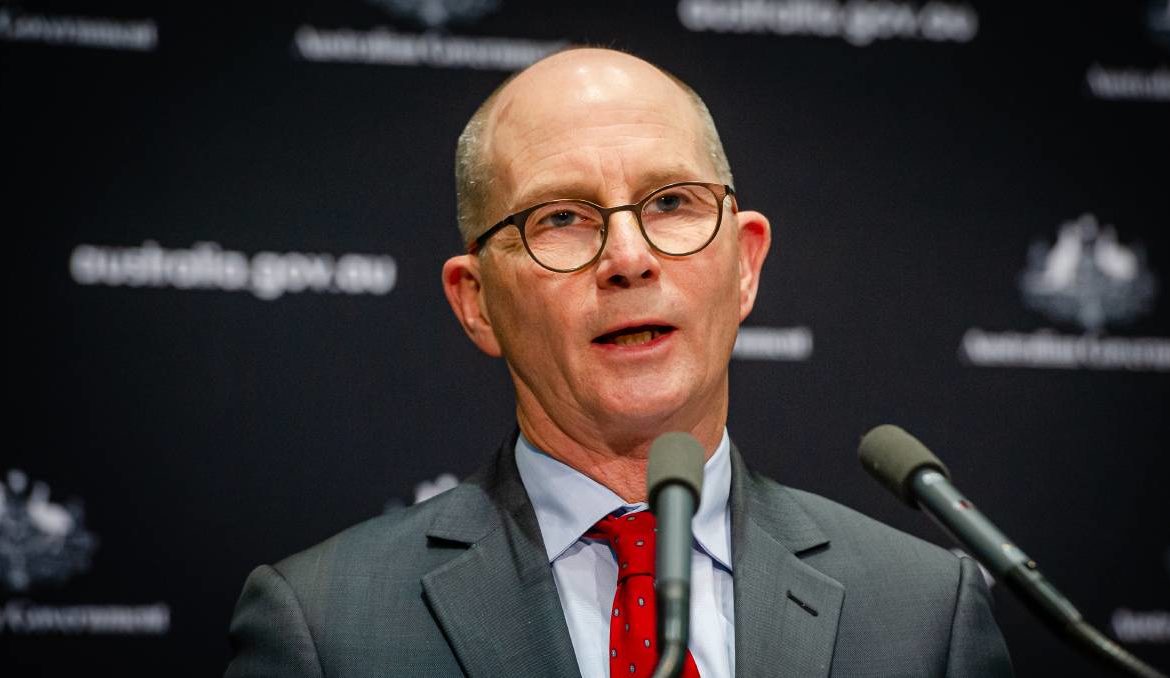coronavirus,
Australia’s Chief Medical Officer is sticking by the government’s promise that the first vaccines against COVID-19 will be administered in the next three weeks, even though the 80,000 doses to be delivered by Pfizer are yet to leave Europe. The European Union’s ambassador to Australia Michael Pulch sought to allay fears the first doses of the Pfizer vaccine would be held up by border controls, saying Australia can rely on deliveries from Europe. “The shipments to Australia will arrive on time. My colleagues in Brussels have assured the Australian side that they will work with them on the smooth authorisation process,” he told ABC Radio. Professor Paul Kelly wouldn’t name a date for the vaccine doses to arrive on Australian shores, but said once they do arrive, it will be a matter of “days rather than weeks” for the Therapeutic Goods Administration to run its final tests on each batch of the vaccines imported into the country. “We will have doses ready to be injected before the end of February,” Professor Kelly said. The Australian government doubled its order with Pfizer last week, with 20 million doses of the vaccine from the company now due by the end of the year. The first shipment will be 80,000 doses, but it’s unclear how many will arrive in each shipment after that. “A weekly delivery is what we were aiming for. That’s assuming no disruption to supply and at the airbridge and so forth, but we will be expecting to receive them every week, we will be starting to vaccinate within a few days of them being available.” Both of the main vaccines to be used in Australia, from Pfizer and AstraZeneca, require two doses to be effective. Professor Kelly said doses wouldn’t be kept in storage to ensure second doses would be available, to ensure as many people start the vaccination process as quickly as possible. “We need to make sure that we have enough for [second doses], we don’t want a lot of vaccines sitting around in warehouses so we’ll be looking to roll out for those priority populations … as soon as we can.” The gap between doses for the Pfizer vaccine is three weeks, but as AstraZeneca is yet to be approved by the regulator, the gap required has not been confirmed. Professor Kelly said it looked likely it could be longer than three weeks.
/images/transform/v1/crop/frm/fdcx/doc7bs4f927ipkplxbpgn3.jpg/r10_207_4047_2488_w1200_h678_fmax.jpg
Australia’s Chief Medical Officer is sticking by the government’s promise that the first vaccines against COVID-19 will be administered in the next three weeks, even though the 80,000 doses to be delivered by Pfizer are yet to leave Europe.
The European Union’s ambassador to Australia Michael Pulch sought to allay fears the first doses of the Pfizer vaccine would be held up by border controls, saying Australia can rely on deliveries from Europe.
“The shipments to Australia will arrive on time. My colleagues in Brussels have assured the Australian side that they will work with them on the smooth authorisation process,” he told ABC Radio.
Professor Paul Kelly wouldn’t name a date for the vaccine doses to arrive on Australian shores, but said once they do arrive, it will be a matter of “days rather than weeks” for the Therapeutic Goods Administration to run its final tests on each batch of the vaccines imported into the country.
“We will have doses ready to be injected before the end of February,” Professor Kelly said.
The Australian government doubled its order with Pfizer last week, with 20 million doses of the vaccine from the company now due by the end of the year. The first shipment will be 80,000 doses, but it’s unclear how many will arrive in each shipment after that.
“A weekly delivery is what we were aiming for. That’s assuming no disruption to supply and at the airbridge and so forth, but we will be expecting to receive them every week, we will be starting to vaccinate within a few days of them being available.”
Both of the main vaccines to be used in Australia, from Pfizer and AstraZeneca, require two doses to be effective. Professor Kelly said doses wouldn’t be kept in storage to ensure second doses would be available, to ensure as many people start the vaccination process as quickly as possible.
“We need to make sure that we have enough for [second doses], we don’t want a lot of vaccines sitting around in warehouses so we’ll be looking to roll out for those priority populations … as soon as we can.”
The gap between doses for the Pfizer vaccine is three weeks, but as AstraZeneca is yet to be approved by the regulator, the gap required has not been confirmed. Professor Kelly said it looked likely it could be longer than three weeks.
Chief Medical Officer Paul Kelly. Picture: Elesa Kurtz







